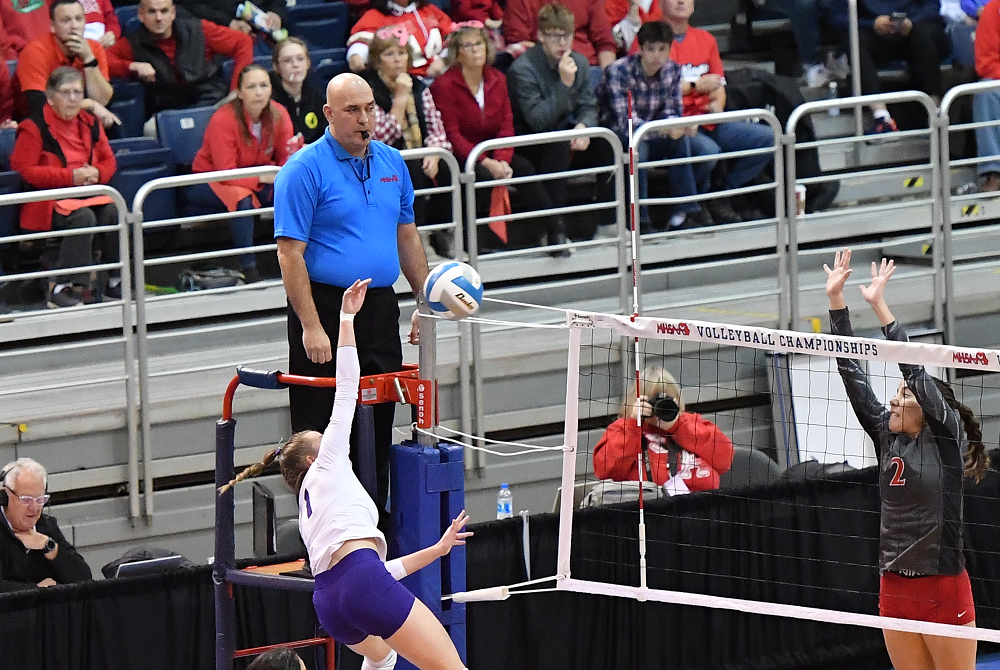
Be the Referee: Registration Process
By
Sam Davis
MHSAA Director of Officials
September 26, 2023
Be The Referee is a series of short messages designed to help educate people on the rules of different sports, to help them better understand the art of officiating, and to recruit officials.
Below is this week's segment – Registration Process - Listen
We talk a lot about the need for registered officials. But how do you sign up? What does it take to become a referee, umpire, or judge?
The steps are simple. Go to MHSAA.com to the “Officials” tab and identify the sport or sports you are interested in. Next, complete the MHSAA Principals of Officiating and the Officials Guidebook Exams.
The Officials Guidebook covers basic elements and procedures for becoming a sports official. This first step of the process covers playing rules, ejection protocols, game assignments, and payment of game fees.
Once you pass the exams, it’s time to connect with a locally-approved officials association. The local associations are the ones that provide the training – whether it’s on the court, on the field, on the mats, or video training – to get that person completely immersed in the rules, mechanics, and coverages of what it takes to become a good official.
Previous Editions
Sept. 20: Animal Interference - Listen
Sept. 13: Feet Rule on Soccer Throw-In - Listen
Sept. 6: Volleyball Jewelry - Listen
Aug. 30: Football Rules Similarities - Listen
Aug. 23: Football Rules Differences - Listen
(PHOTO by Gary Shook.)

Several Officials Give Time, Talents to Grant $21,000 in Scholarships at 22nd LMCCOA Meet
By
Steve Vedder
Special for MHSAA.com
February 14, 2024
Jane Plaisted thinks it's one of those rare high school sporting events where scores and winners are secondary.
Instead, the focus of the recent Lake Michigan Competitive Cheer Officials Association meet is what the event could do for 75 seniors who competed in the sprawling 45-team meet at Byron Center.
All proceeds from the event went to fund scholarships for seniors who opted to write essays and then competed in the annual 22-year-old, three-division meet. The competition, which was completely run by LMCCOA judges, raised $21,000 to up its fundraising total to over $200,000 since the meet originated in 2001.
"It was a glorious day," said Plaisted, an LMCCOA member who has participated in 15 of the competitions. "The girls are happy, we're happy to give our time and it's such a positive day. We love being a part of it."
The event drew teams from as far away as St. Johns, DeWitt, Kalamazoo and Howard City Tri County. The chance to earn scholarship money was open to all 190 seniors who competed, and 75 chose to write an essay about "talking to their younger self and determining how competitive cheer has helped the athlete," said Stacy Smith, the president of the Michigan Cheer Judges Association. Smith said much of the event's dual goal is to promote competitive cheer while helping senior athletes wherever there is a financial need.
 The meet started with just five teams and a few hundred dollars in scholarships in 2001, but has blossomed into one of the largest single-day high school sports fundraisers in the state. The meet, which has been held at Byron Center three times as well as schools such as Caledonia and East Kentwood, reached a peak of raising $25,000 a year ago.
The meet started with just five teams and a few hundred dollars in scholarships in 2001, but has blossomed into one of the largest single-day high school sports fundraisers in the state. The meet, which has been held at Byron Center three times as well as schools such as Caledonia and East Kentwood, reached a peak of raising $25,000 a year ago.
What makes the day particularly special, Smith said, is that between 50 and 70 members of the LMCCOA annually show up to donate their time without knowing how their abilities will be put to use. In addition to judging the meet, members handle virtually every other aspect of the competition, from taking tickets, working the concession stand, filling water bottles, scoring, running a 50/50 raffle and whatever else organizers can find for them to do.
"Cheer athletes aren't always recognized a lot for their work, but it's a sport where (Michigan) colleges have gained notoriety at the national level and now offer scholarships," Smith said. "It's become a big deal in the state. Division I and II schools and NAIA schools all offer scholarships now. This can help."
Seniors who choose to participate write their essay prior to the meet, and then a committee of judges pore over the writings during the meet. Winners are announced following the competition. Twenty-one seniors were awarded scholarship money.
Smith said few parents probably grasp how much detail goes into running a long, grueling Saturday event.
"I'm not sure if people realize all the hands that have to make this happen," she said. "We've been doing it for 20 years, and for us it's like riding a bike. You never forget. It's just a wonderful day.
"I'm not surprised people want to be part of it and step up wherever they're needed."
Plaisted said judges sign up for jobs when they arrive at the meet. A judge can be officiating an event one minute and selling hot dogs moments later. The 'work wherever needed' attitude of judges, she said, is what makes the event a popular destination for participating schools.
"As officials, we emphasize young women participating," she said. "That old concept of the dumb blonde cheerleader doesn't exist anymore. This is an accomplished group of girls who we support. If you talk to any of (the judges), this meet is one of the most fun things we're going to do all season.
 "It's become so popular. We gave away like $50 the first year, and since then we've grown from one long day to two sessions so we could increase the number of teams. Everyone goes home with a smile on their face, which for officials doesn't always happen."
"It's become so popular. We gave away like $50 the first year, and since then we've grown from one long day to two sessions so we could increase the number of teams. Everyone goes home with a smile on their face, which for officials doesn't always happen."
Paw Paw cheer coach Stefanie Miller, whose team won the Division 3 portion of the meet, said coaches look forward to taking their teams to the meet.
"Absolutely because it's all about community," she said. "We talk to the girls about service and giving back. It's definitely a teachable moment, not only for the kids but for the adults, too, knowing what goes to the seniors."
"What I like best is that it promotes the athletes and all the work they put in. It's about giving back to them," added Brighton coach Christina Wilson, whose team won the Division 1 competition. "So many teams want to attend, and the coaches want the players to have a chance at a scholarship.
"I'm just in awe of seeing so many people there who are willing to give their energy for the kids."
One of Miller's favorite parts of the meet is watching fathers do a cheer "jump off" of their own tongue-in-cheek cheering skills while waiting for the final scores. She also loves volunteers making nearly 200 bows for participants to wear during the meet.
"Fathers do these cheerleader-type (routines) while there is a lull and it's just great," she said. "It's fun stuff like that that makes the day so special. It's all about giving back."
PHOTOS (Top) MHSAA official Jane Plaisted takes a photo with this year’s LMCCOA Division 1 scholarship winners. (Middle) Several officials contribute to making the meet an unforgettable experience. (Below) The LMCCOA also awarded scholarships to seniors from Division 2 and 3 schools. (Photos courtesy of Stacy Smith.)

